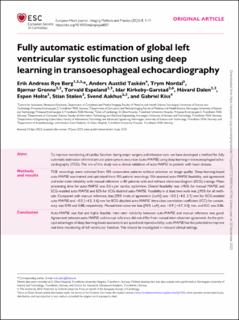Fully automatic estimation of global left ventricular systolic function using deep learning in transesophageal echocardiography
Berg, Erik Andreas Rye; Tasken, Anders Austlid; Nordal, Trym; Grenne, Bjørnar Leangen; Espeland, Torvald; Garstad, Idar Kirkeby; Dalen, Håvard; Holte, Espen; Stølen, Stian Bergseng; Aakhus, Svend; Kiss, Gabriel Hanssen
Journal article
Published version
Permanent lenke
https://hdl.handle.net/11250/3104261Utgivelsesdato
2023Metadata
Vis full innførselSamlinger
Originalversjon
https://doi.org/10.1093/ehjimp/qyad007Sammendrag
Aims To improve monitoring of cardiac function during major surgery and intensive care, we have developed a method for fully automatic estimation of mitral annular plane systolic excursion (auto-MAPSE) using deep learning in transoesophageal echocardiography (TOE). The aim of this study was a clinical validation of auto-MAPSE in patients with heart disease. Methods and results TOE recordings were collected from 185 consecutive patients without selection on image quality. Deep-learning-based auto-MAPSE was trained and optimized from 105 patient recordings. We assessed auto-MAPSE feasibility, and agreement and inter-rater reliability with manual reference in 80 patients with and without electrocardiogram (ECG) tracings. Mean processing time for auto-MAPSE was 0.3 s per cardiac cycle/view. Overall feasibility was >90% for manual MAPSE and ECG-enabled auto-MAPSE and 82% for ECG-disabled auto-MAPSE. Feasibility in at least two walls was ≥95% for all methods. Compared with manual reference, bias [95% limits of agreement (LoA)] was −0.5 [−4.0, 3.1] mm for ECG-enabled auto-MAPSE and −0.2 [−4.2, 3.6] mm for ECG-disabled auto-MAPSE. Intra-class correlation coefficient (ICC) for consistency was 0.90 and 0.88, respectively. Manual inter-observer bias [95% LoA] was −0.9 [−4.7, 3.0] mm, and ICC was 0.86. Conclusion Auto-MAPSE was fast and highly feasible. Inter-rater reliability between auto-MAPSE and manual reference was good. Agreement between auto-MAPSE and manual reference did not differ from manual inter-observer agreement. As the principal advantages of deep-learning-based assessment are speed and reproducibility, auto-MAPSE has the potential to improve real-time monitoring of left ventricular function. This should be investigated in relevant clinical settings.

